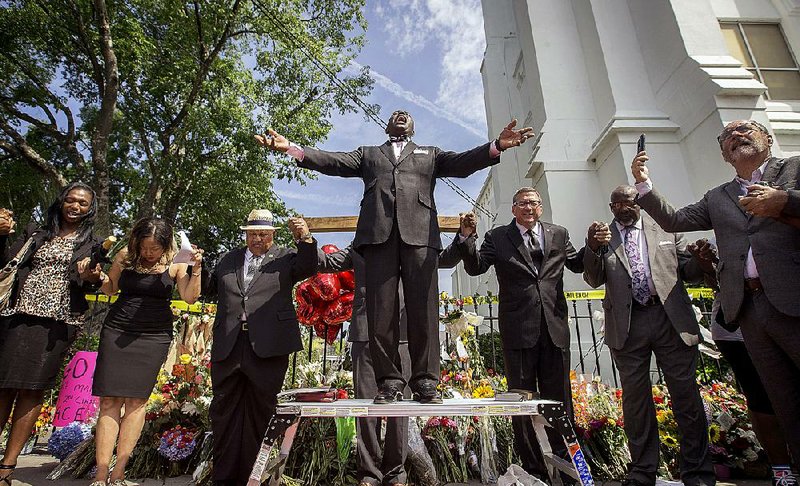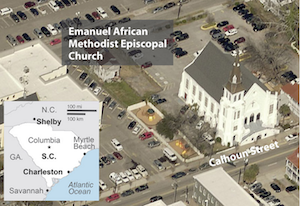CHARLESTON, S.C. -- After a white police officer in neighboring North Charleston shot and killed Walter Scott -- black, unarmed and in full view of a camera -- there was anger, and there were protests. But this storied Southern city did not burst in conflagrations like Ferguson and Baltimore.
In a state where the Confederate battle flag still flutters over the Capitol grounds, Charleston is a place frequently described as "genteel," and -- because of the abundance of churches -- as "the Holy City." People there say it's awkward, if not impolite, to talk about race.
Now, after the shootings at Emanuel African Methodist Episcopal Church -- reportedly at the hands of a 21-year-old white man fond of white-supremacist symbols, police say -- the subject is inescapable. Many black people say a sense of abiding uneasiness was never far from the surface.
"Black folks remain on edge, especially since this is the South, and we got history," said Clinton Brantley, 73, pastor of St. Matthew Baptist Church in North Charleston.
A small group of parishioners was allowed inside the bullet-scarred church Saturday, getting a firsthand look of the room where nine people from their congregation were slain.
Cleaning crews worked at Emanuel African Methodist Episcopal Church on Saturday, and church members announced that they will hold a service there today. Harold Washington, 75, was with the small group that saw the lower-level room where the victims were shot.
"They did a good job cleaning it up," he said. "There were a few bullet holes around, but what they did, they cut them out so you don't see the actual holes."
He said he expects an emotional service with a large turnout today.
"We're gonna have people come by that we've never seen before and will probably never see again, and that's OK," he said. "It's a church of the Lord -- you don't turn nobody down."
Kay Hightower, 50, attends Emanuel AME and knew the pastor -- one of the shooting victims -- well.
"People need to take ownership of all the history," she said. "And that's a painful thing to do. Until you have these awkward conversations, you can't get over it."
She said she was troubled when she heard a politician describe the church massacre as "an attack on Christians," because in her mind that misses the point. The victims in the church "were murdered for the color of their skin," she said.
And she took issue with another politician's description of a mixed-raced crowd of mourners as "the real South Carolina."
"The problem with statements like that is Mr. Roof is also the real South Carolina," she said, referring to Dylann Storm Roof, the man accused of killing the nine people at the church.
Hightower commended North Charleston for handling Scott's shooting by condemning the white officer's behavior and lodging a charge of murder against him. She and others believe city leaders' swift action prevented greater furor.
"They saw murder the way we all saw murder," Brantley said.
"Things were actually getting better after Walter Scott," said Jessica Prince, 29, a Charleston native who, like others, said racial divisions have been simmering for years. "When will we be comfortable getting in our cars, even to go to church? We were just starting the healing process. It puts your guard up."
Pastor Thomas Dixon, who leads People United to Take Back Our Community, based in the Charleston area, said the black community felt discontent and wariness.
"We're still getting unjustly stopped by police when we walk. We're watched in stores as we shop. Nothing changes. This happens to black people not just in the South, but everywhere," said Dixon. "There are definitely hotheads out here in the black community ready to go off. We don't preach violence, but sometimes people will use it to get a reaction."
Lonnie Randolph, 65, president of the South Carolina State Conference of the NAACP, said the state's white majority still operates in a "Confederate mentality," flying the flag of the Confederacy at the Statehouse and blocking minority-group voters and minority-group representation on state boards, including universities.
"They are a C-minus in this state, close to a D," he said of race relations.
The state's population is 68 percent white and 28 percent black. Of 170 seats in the state Legislature, 38 are held by members of the South Carolina Legislative Black Caucus (Emanuel's slain pastor, Clementa Pinckney, held a 39th seat). Randolph noted that only one of the state's seven U.S. congressmen is black, though the state has a black U.S. senator, Tim Scott.
Studying manifesto
The FBI said Saturday that it was investigating a website displaying a manifesto possibly written by Roof.
The website linked to Roof contained photos of him holding a burning American flag and standing on one. In other images, he was holding a Confederate flag, considered a divisive symbol by civil-rights leaders and others.
The 2,500-word essay talks about white supremacy, and the author says "the event that truly awakened me was the Trayvon Martin case" -- the unarmed black teenager fatally shot by neighborhood watch volunteer George Zimmerman while walking home in Florida in 2012.
The manifesto said "it was obvious that Zimmerman was in the right" and that the case led the author to search "black on White crime" on the Internet.
"I have never been the same since that day," it said.
It's unclear whether Roof wrote the rants, but they are in line with what he has told friends and what witnesses claim he said before opening fire inside the Emanuel African Methodist Episcopal Church on Wednesday night.
Internet registry records show that the website was created Feb. 9 via a Russian registry service with the owner's personal details hidden. A man who answered the phone at the Moscow-based company would not say who the site's owner was.
The site shows a stash of 60 photographs of Roof, many at Confederate heritage sites or slavery museums. He posed for pictures wearing a No. 88 T-shirt, had 88 Facebook friends and wrote that number -- white supremacist code for "Heil Hitler"-- in the South Carolina sand.
In one picture, Roof is shown posing with wax figures of slaves. In others, he posed with a handgun that appears to be a .45-caliber Glock. He had a .45-caliber Glock in his car when he was arrested Thursday, the police said.
Roof is alone in all of the photos, which show a slave plantation; Sullivan's Island, S.C.; and the Museum and Library of Confederate History in Greenville, S.C.
It is not clear whether he took the pictures with a timer, or if someone else took them.
Roof is being held in jail, facing nine counts of murder and a weapons charge.
A police affidavit released Friday accused Roof of shooting all nine church victims multiple times and making a "racially inflammatory statement" as he stood over an unidentified survivor.
Roof had complained while getting drunk on vodka recently that "blacks were taking over the world" and that "someone needed to do something about it for the white race," according to Joey Meek, who tipped off the FBI to Roof's identity when he saw his friend in surveillance images.
Skeptical of curbs
Lawmakers and activists have said there is little evidence that the killings would make congressional action to curb guns more likely, considering recent history.
Conceding that congressional action was unlikely soon, President Barack Obama said lawmakers will tighten federal firearms restrictions when they believe the public is demanding it.
"I'm skeptical it's going to change people's minds who weren't converted by Newtown," said Sen. Chris Murphy, D-Conn. Murphy was part of the Senate's failed efforts to strengthen background checks after the 2012 massacre of 26 children and educators at Sandy Hook Elementary School in Newtown, Conn.
If anything, the odds of congressional action seem slimmer with the House and Senate dominated by Republicans, who traditionally have been less sympathetic to curbs on gun ownership. When the Senate rejected firearms constraints in 2013 prompted by Newtown, the chamber was led by Democrats.
"He couldn't get it going after Sandy Hook with Democratic control" of the Senate, Erich Pratt, spokesman for Gun Owners of America, a gun-rights group, said about Obama. "He won't get it going with Republican control."
"The question remains how we keep guns out of the hands of those who shouldn't have them without violating the constitutional rights of law-abiding Americans," said Senate Judiciary Committee Chairman Chuck Grassley, R-Iowa. "There's ample time to learn more about what happened and debate ways to prevent these kinds of senseless acts."
Murphy and others blamed the power of the National Rifle Association for Congress' unwillingness to restrict firearms.
NRA spokesman Andrew Arulanandam would not address whether the Charleston shootings would change lawmakers' attitudes, saying, "As the NRA has done for decades, we will not comment until all the facts are known."
Democratic presidential candidate Hillary Rodham Clinton pledged to fight "for common-sense reforms" and bemoaned gridlock in Congress over legislation to require universal background checks for people buying guns.
"It makes no sense that we couldn't come together to keep guns out of the hands of domestic abusers or people suffering from mental illnesses, even people on the terrorist watch list," Clinton said Saturday at a U.S. Conference of Mayors meeting in San Francisco. "That doesn't make sense, and it is a rebuke to this nation that we love and care about."
Clinton's speech was one of her first major addresses after the national tragedy and as she makes her case for the White House. The former senator, secretary of state and first lady echoed Obama's remarks at the mayors' event Friday, in which he said mass shootings were becoming too commonplace and called for curtailing easy access to firearms.
Information for this article was contributed by Molly Hennessy-Fiske, Christopher Goffard and Kurtis Lee of the Los Angeles Times; by Jeffrey Collins, Emily Masters, Seanna Adcox, Phillip Lucas, Meg Kinnard, Eric Tucker, David Goldman, and Alan Fram of The Associated Press; by Frances Robles of The New York Times; and by Alison Vekshin and Madeline McMahon of Bloomberg News.
A Section on 06/21/2015


